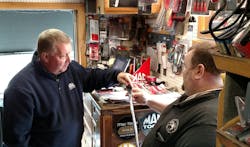“If you’re going to sell dog food, you’d better be ready to eat dog food,” said my college advertising instructor, Leo Olson. I’m sure you can imagine my class’ reaction… Eeeeewww!
My suggestion to you is a bit less distasteful: “If you want to sell to shop owners, you need to learn to think like a shop owner.”
There are some subtle and some big differences between what a technician wants from you and what a shop owner wants. I talked to three successful shop owners (one on each coast and one in the Midwest) to get some insights. Here’s what I learned.
Q: I find it hard to sell to shop owners. Am I alone?
A: I don’t think you’re alone. But most shop owners are really no different than the technicians you deal with every day. The issue may be that you feel a bit intimidated by them or by their “big ticket” purchases.
The shop owners I talked to are all technicians. Many independent repair shops are owned by a technician. Some are former technicians, but most still turn a wrench at least a couple days a week. So they’re both a technician buying tools and a shop owner buying equipment. After decades as a technician, they may not need as many tools as their employees. And when spending on shop equipment, they often want to do their homework and know their options.
Keep in mind you have a lot in common with the shop owner. You’re both business owners. You understand the common headaches of ownership like inventory, cash flow, downtime, debt service and things like that. So, don’t be intimidated. Try to find the common ground.
Q: What’s the most important thing a shop owner wants from a dealer?
A: First and foremost: Show up. Really! Just show up.
“Showing up is 80 percent of success,” Woody Allen once quipped. He could have been talking about the tool distribution business as much as show business.
The shop owners all agreed: A tool dealer who doesn’t keep on schedule will lose sales.
“Our day is Thursday,” says Dave Walter, owner of Kehoe Automotive in Carol Stream, Ill., and former president of ASA Illinois. “If our tool dealer is here Thursday at 10 o'clock in the morning or 10:30 in the morning, I don't really care. But the day is Thursday, and if he's not going to be here, he needs to let us know. … I rely on these guys. If I have a broken tool, and I can wait, I’m going to wait until Thursday. If he doesn’t show up, I’m screwed.”
Being able to count on his tool dealer to show up when he needs him is also a top priority for Pete Rudloff owner of Pete's Garage in Newark, Del., and an automotive technical writer for ASA’s Auto, Inc. magazine.
“If I call my main tool guy up at 5 o’clock on a Friday, I can say ‘Hey I’m in trouble. Where are you? Can you come meet me somewhere and bring me a tool?’” says Rudloff.
Walter echoed the story of meeting a dealer for a much-needed tool. “I’ve been told I’m very fortunate,” says Walter. He can often meet up somewhere with one of his two dealers if he needs a new or replacement tool in a pinch.
“Sometimes it’s the luck of the draw,” says Phil Fournier, owner of Phil’s Auto Clinic in Hemet, Calif., and an automotive technical trainer. “The tool dealer that’s at the shop when I have a specific need for a specialty tool will get the sale.” Other times, Fournier says, it’s the dealer who responds to an urgent call and delivers a tool that gets the sale -- assuming he has it in stock. (Note: good inventory is also very important!)
Q: So I just show up. That’s all?
A: Sometimes it’s not just showing up. But it’s important to know when to show up.
You can make fast friends with a shop owner just by being sensitive to how much of his technicians’ time you’re taking up every week.
“It’s in the best interest of the tool guy to get on good terms with the shop owner. Tell him you don’t want to cut into his work day,” says Fournier. Working with the shop owner to try to schedule your stops during a break time or on a slow day can help you get on a shop owner’s good side.
Fournier remembers his first boss complaining about how much time the tool trucks ate away at his shop’s productivity.
The 15 minutes or so that one technician is on your truck may not seem like a big deal. But multiply that by the number of techs in the shop and then by three of four tool trucks each week and then by 52 weeks in a year -- it can add up to over a week's worth of billable hours.
Q: How else can I get on a shop owner’s good side?
A: It’s like dealing with anyone. You get on his good side by avoiding the things that put you on his bad side. Each shop owner was very clear: They’ve all had bad experiences with tool dealers, but their current dealers are exceptional -- all very attentive and knowledgeable. (So, if you’re one of those dealers, you’re off the hook!)
One of Fournier’s pet peeves is when a tool dealer stops showing up. He realizes this is often because he is not a regular customer. But if he has ever bought from a dealer, he’d like them to check in. Perhaps he has a warranty need. Perhaps he wants to start buying again.
I can see both sides of this. Why should a dealer make the time to stop at a shop that isn’t buying? But a dealer will never win back a customer by ignoring him, either. Consider a monthly stop to check on a customer. Help him with a warranty and you may earn back more of his business. If the shop is out of the way, try phoning or texting.
Q: What else is important?
A: Shop owners are not different than any other customer. They want to buy from a friendly and knowledgeable professional.
“It’s really about knowing that they know their product,” says Rudloff. His ideal tool dealer has strong product knowledge and can readily answer three questions: “Do you know what you have on the truck? Do you know what it does? And if you don’t have it, do you know how to get it?”
He reminds me that it’s important to sell yourself, first. Customers are buying first from you, then from your flag.
“If our primary tool distributor switched to a different brand of tools we would follow him and start equipping ourselves with a different brand of tools,” says Rudloff of his loyalty to his dealer who has earned his trust over the last 20-plus years of doing business together.
Q: That’s it?
A: Technicians depend on their tools to make a living. That means they’re depending on you.
“Be here, be competitive and stand behind your product,” Walter says to any tool dealer who wants to earn the business and loyalty of a shop owner like him.
“He’s part of the support system that keeps the shop running,” says Rudloff of his tool dealer. ”So, it’s very important that I buy from him so when we need him that he’s there for us ... We need him as much as he needs us.”
About the Author

Phil Sasso
Phil Sasso is president of Sasso Marketing Inc. (www.sassomarketing.com), a technical marketing agency providing advertising, public relations and promotional services to tool and equipment marketers. Subscribe to his free marketing tip at philsasso.com/blog.
